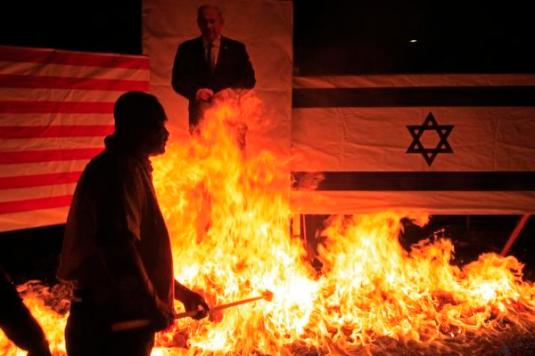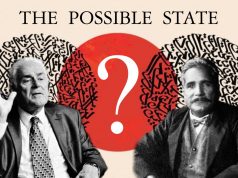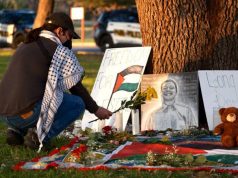Being at such a critical juncture of human history where unpredictable events are unfolding daily, we as common people stand back and merely spectate the changing dynamics of the modern world. It has been one full year since all those brutalities and inhumane hawkishness have been unleashed, taking its roots from the October 7 event. Crossing all limits of ferocious aggression, Israel has left no stone unturned in carrying out destruction and systematic genocide. Israel has successively killed more than 40,000 indigenous civilians of Gaza which includes 17,000 innocent children and 12,000 defenseless women. Israel has unfurled its atrocities on combatants as well as on non-combatants alike. Israel has also been criticized for using AI for airstrikes. Beginning a brutal assault on Lebanon, Israel is targeting civilian areas and has simultaneously launched a well-planned cyber-attack by exploding around 5,000 pagers across Lebanon. In the past few days, Israel has immensely bombarded South Lebanon and has been successful in killing top Hezbollah leadership such as, Hasan Nasrallah.
Despite all these atrocities and sufferings of the oppressed, this conflict has another aspect that is remarkable in the modern history of anti-colonial history. This conflict has been proven as an important milestone in the history of Palestinian resistance especially from military, economic, and growing anti-occupation public opinion aspects. It has exposed the aura of Israel’s invincibility. It has turned upside down the military equations which is incredible. According to some military experts, Israel is in its weakest condition since its establishment.
1) Military Aspect:
October 7, 2023, was marked by a great dynamic turn in terms of the security and military arena of the state of Israel. It triggered an unprecedented period of adversity for both the IDF and the State of Israel at large. October 7, 2023, potentially dismantling multiple illusions, left not just Israel but the entire planet awestruck by the very move of Hamas. Around 3,000 Hamas fighters sacked the complete army of Israel, deployed in the Gaza envelope area -in just a few hours – was assigned to watch and dismantle the Palestinian resistance groups in Gaza. This surprise attack broke the Israeli aura of invincibility.
Israel extensively bombarded almost the entire territory of Gaza, a region that consists of highly populated areas including educational institutions some of which were UN-run schools as well, hospitals, and all other infrastructure necessary for human life. It has been a whole year of Israeli military invasion of a small besieged enclave where Israel has not been able to achieve any of its goals except for the genocide of common folks by wiping out entire families from the face of this earth. Despite its cold-blooded murders, Israel could not destroy Hamas. According to the Israeli military officers, Hamas personnel take back areas under their control 30 minutes after the Israeli military leaves that area. According to war experts, Hamas has changed this war into a war of attrition.
Hamas, on the other hand, has explicitly demonstrated its military power and war tactics which has surprised a plethora of military academies. Despite unconditional support from the United States and other European countries for the state of Israel in receiving supplies of arms and ammunition and high-tech surveillance systems, Hamas has successfully maintained its military maneuvers. The launch of missiles now and then throughout the year is no less than a miracle of the 21st century. Hamas in this way has given a new face to urban warfare where it has destroyed hundreds of Israeli tanks and military vehicles (worth around USD3.5 million each) with its Yaseen 105 anti-tank missile (worth around USD100 each) which also has been a new development in the world of arms. It has reversed the equation. It has proved Hamas’s ability, hard work, and military engineering through which they were able to destroy the world’s most advanced Israeli tank Merkava 4 which cost USD 3.5 million with a Yaseen-105 homemade anti-tank missile which cost around USD 100. It has increased the economic burden of war on Israel.
On the second front, Hezbollah has launched well-planned attacks on northern Israel to show its support for the Palestinian freedom struggle. Hezbollah, hence has created a new challenge for the Israeli military since October 8, 2023. Launching successive attacks on the illegal Israeli settlements has displaced thousands of settlers from northern Israel to other areas across the country. In recent weeks Israel has assassinated top leadership of Hezbollah Including its then chief Hasan Nasrullah. It has started to bomb southern Lebanon and has displaced over a million Lebanese people, many of whom are forced to sleep in tents as they have practically nowhere else to go.
Hezbollah has revealed its new military power, especially the missiles of the Fadi and Qader series which are capable of directly hitting Tel Aviv in just a few minutes. Despite thousands of Israeli air strikes on Hezbollah targets and assassination of top leadership, Hezbollah has maintained its military capabilities which are becoming a big threat for Israel. Hezbollah has deliberately not revealed much of its military arsenals yet. Israel has declared its goal of attacking Lebanon to disarm Hezbollah and to return the settlers to northern Israel which most probably Israel is never going to achieve.
The third front is the West Bank which also has increased challenges for Israeli forces. Since October 7, the said region has been encircled by sheer violence. Thousands of Palestinians have been arrested and put in jails, that too without legitimate and fair trials, hundreds of others have been killed and the infrastructure within the territory is being destroyed steadily. Despite a multilayered crackdown, and security cooperation from the Palestinian Authority, the West Bank has been resisting with even more intensified plans and face-offs. Many groups are fighting against unlawful Israeli occupation forces and the war has shifted now from guns to homemade highly explosive landmines and from individual attacks to well-planned ambushes. The whole area is burning with rage and it can become a volcano at any moment.
The fourth front consists of Iraqi militant groups, Yemeni Houthis and Iran which do not share a border with Palestine and Israel but are a significant part of the anti-occupation struggle. Iraqi militant groups have successfully attacked Israel on various times by drones which is also proof of Iron Dome’s failure. Houthis on the other hand have imposed a sea blockade on the ships heading towards Israel. Houthis of Yemen made a big advancement by launching a Palestine-2 ballistic missile which successfully hit Tel Aviv in only 12 minutes without any interception which was also a heavy blow for the Israeli air defense system.
Iran, in the meanwhile, has also launched a barrage of around two hundred ballistic missiles on Israel in recent days to avenge the assassination of Ismail Haniyeh and Hasan Nasrullah. Iran has shaken the US and other Western powers supporting Israel and underestimating Iran. This scenario has given a blow to the US and its allies in the Middle East and has created a full-scale warlike situation in the Middle East. After assessing the whole situation, it has become clear that Israel seems to be an all-time weak from a military perspective.
2) Diplomatic Blow:
The eruption of conflict after October 7, 2023, completely changed the Middle East’s geopolitics focusing on Israel in particular. As the tensions have mounted, the region has witnessed a complicated interaction of military engagement with diplomatic maneuvering, which finally came to fruition in the marked shift in international relations and perception towards the state of Israel.
As an immediate consequence of the violent break-out, Israel was left at the mercy of opinions since most countries condemned Israel’s military action in Gaza, although it was still considered to be a country with fair support from its Western allies; however, the swiftness and wide range of the military operation incited widespread outcry around the globe. Even reports of civilian casualties and humanitarian crises in Gaza had intensified calls for restraint, with many voices ringing in international forums, including the United Nations. All these developments brought about a clear shift in the public and diplomatic mood, at least in those countries that have traditionally been aligned with Israel ever since its establishment in 1948.
Significant diplomatic gains from the escalation are the enhanced recognition of Palestinian statehood. Various nations and international entities greatly emphasized the urgency to end the genocide of Palestinians and to resume global talks on the Israeli-Palestinian conflict. Countries of the global South are particularly and patiently standing in solidarity with Palestine to demand a just settlement of the conflict. That is what we are seeing in votes and statements made within the United Nations and other such international forums, where unprecedented momentum is seen in calls for due Palestinian rights.
Moreover, the Palestinian leadership has initiated discussions with the essential international state and non-state actors that expressed the need for relief efforts while campaigning for political measures. The European Union and numerous NGOs have been tapped to garner humanitarian assistance even as Palestinian rights to sovereignty and self-determination are restated as essential principles.
3) Changing Public Opinion:
The atrocities that are happening have dramatically changed global public opinion on the Israeli-Palestinian issue. As the sentiment shifts around and gathers more anti-Israel and pro-Palestine sentiments, some factors have played a key role in the shift: social media dynamics, increased human-centric issues awareness, and grassroots activism.
• Humanitarian Crises Became Highly Visible
Such is the context of social media images and videos in which critical graphic images and reports of killing, destruction, and loss of civilians in Gaza have echoed into every corner of social media and news organizations, visceral portrayals that would galvanize public empathy across the globe, and to many, ceased being a geopolitical quagmire and became a human rights crisis, an issue that direly calls for immediate action.
• Grassroots Movements
Just after the outbreak, grassroots movements that advocated for Palestinian rights saw a boost in other parts of the world. Thousands of people demonstrated in major cities around the world, often led by the BDS (Boycott, Divestment, Sanctions) and other activism groups, as this mobilization outside of the original activist proclivities focused more on perceived injustices and inequalities in society to bring about a policy change; however, it was helped especially through social media, where quick grassroots coalitions could reach the word effectively and quickly to a lot of people.
• Change in Political Rhetoric
The events after October 7 played their part in the significant development of the political discussion of various countries. Criticism of Israeli policies and responses from their military machines, concerning accountability and human rights issues, is always viewed as a kind of ‘red line’ and was, during the events and particularly after them, crossed by politicians and public persons. Calls for the reassessment of military aid to Israel started to grow in some Western nations as there was a disconnection that became evident between the traditional support and new public feeling. More specifically, pro-Palestinian political parties began gaining popularity, indicating a deeper change in voter values.Increased
• Media Coverage and Analysis
Media reporting about the conflict shifted qualitatively with most channels adopting a more critically skeptical view of the military actions by Israel and emphasizing the longstanding Palestinian issue. The analysis of the broader historical context of the Israeli-Palestinian dispute became more pronounced than ever, putting into perspective the issues at play for viewers. Such a shift in narrative fostered more sophisticated debates about power, occupation, and humanitarian needs.
• Influence of International Human Rights Organizations
International human rights organizations were some of the other voices that shaped public opinion. Statements and reports from entities such as Amnesty International and Human Rights Watch voiced international condemnation of Israeli actions by framing them as a part of human rights violations. The world is becoming increasingly aware of human rights and ethical principles behind international policy. Therefore, such analyses might continue to push public opinion toward support for Palestine.
4) Stopping Normalization
Escalating violence that has being going for one year have caused a significant setback to the normalization processes that had been progressing since the Abraham Accords were signed in 2020 among Israel and several Arab countries. The day marks a turning point in the regional dynamics that followed, stopping diplomatic engagement and rekindling sentiments of solidarity with the Palestinian cause. There have been several main factors behind this setback in normalization efforts.
Normalizers like the UAE and Bahrain, who had begun to normalize relations with Israel, found themselves under increasing criticism and pressure from other regional actors who opposed Israel’s policies. Other nations, such as the Islamic Republic of Iran and Türkiye, readily exploited the situation to reiterate their stance as Palestinian flag bearers, portraying them as the advocates of Ummah’s interest. This pressure made Arab leaders in normalization nations retreat from engagements they had already taken with Israel, not to say the opposition from their societies would isolate them in the region.
As the situation escalated tensions, several Arab countries that had already begun establishing tentative diplomatic relations with Israel decided to climb down. Already planned get-togethers and dialogues were postponed or canceled altogether, and official communications from these governments focused on showing solidarity with Palestine. For instance, Morocco announced normalization efforts had to be put on a permanent backburner based on giving Palestinian rights precedence, followed by Sudan renouncing agreements they had previously signed with Israel.
5) Deteriorating Israeli Economy:
The coincidence of immediate, direct and indirect effects or consequences inherent in the multifaceted nature of the conflict has affected various sectors, which has, on an overall scale, resulted in a sort of ambiguity.
• Stock Market Volatility
The aftermath of the flare-up in violence in Israel saw the stock market take a sharp upswing in volatility from the fear of this geopolitical threat and its likely protracted nature. The uncertainty of military involvement trailed key sectors down in terms of performance technologies, tourism, and consumer goods. Companies reliant on the tourism sector were hit at once as travel advisories were issued and foreign and local tourists were warned to avoid going there.
• Increased Defense Spending
In response to heightened security threats from Hamas and Hezbollah, the defense sector has seen significant increases in the defense expenditure of the Israeli government. Such heightened military spending redirects funds that could have been spent on social services, infrastructure, and general economic development. A short-term benefit of increased government contracts for defense will be business interests, but long-term effects on wider economic stability will be negative. It can be understood through an example that it costs Israel USD 50,000 to USD 2 million to intercept one Hamas rocket which costs only 500 USD.
• Business Disruptions
The constant all-year war has devastated many firms, mainly due to intense disruptions. Affected communities near the disputed zones have been at direct risk; property has been destroyed, and workers were also threatened. Even more important to note, the logistics supply chain was disrupted due to safety concerns and an increase in security. These disruptions affected not only the local economies but led to an even greater slowdown of economic activity.
• Import-Export Shut Down
The world markets reacted to the heightened tensions, and Israel, which is greatly driven by exports, experienced great friction. The fear of instability may cause the intended partner to question the agreements or even wait until the sale with Israel occurs when the country is most in need due to its reliance on technology and defense exports. Other supply chain and logistics barriers could further delay shipments and could affect export-dependent businesses. On the other hand, Houthis have blocked the Bab-el-Mandib which was the central nerve of Israeli import and export. Houthis have been targeting ships heading towards Israeli ports especially carrying military assistance.
6) Internal Chaos:
The turmoil that the war between Israel and Hamas-Hezbollah has unleashed upon the Israeli state, due to the attacks of October 7, 2023, has deeper dimensions in terms of political, social, and psychological manifestations. Violence has caused various types of crises, creating divisions and commotion within Israeli society.
• Deepening Political Divisions within Israel
Conflicts have deepened political divisions within Israel. This escalation has responded differently in various political factions and has given rise to contentious debates on security policies, military strategies, and responses to allegations of human rights abuses by the Palestinians. Public opinion will sharply be polarized; some are demanding a strong military way of dealing with Hamas and Hezbollah while others are supporting diplomatic interventions and press the case on humanitarian concerns. This polarization has made effective governance difficult and has caused a feeling of instability at this moment when unity is of the essence.
• Psychological Impact on the Population
The prolonged nature of the war has been devastating for the psyche of Israeli citizens. Most citizens-including those living around the areas of clashes are scarred by the incursions of rockets, sirens, and bomb shelters. Increased fear, anxiety, and stress in everyday life have led to more mental health problems for many individuals and families in need of some form of psychological counseling. Such a type of trauma may lead to a need for caution by society in the long term. According to the Times of Israel, more than half a million Israelis left the country and did not return during the first six months of conflict and there is no sign of their return. It is the biggest blow to the Israeli occupation because the settlers are the backbone of the Occupation.






